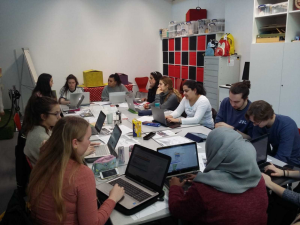‘Hi everyone, I’m Alexandra and I’m a final year Italian and Spanish student here at the University of Reading. My year abroad was split into two semester so I spent September to December in Bologna, Italy and February to July in Seville, Spain.
 My photo is a partial skyline of Seville from the view over the Guadalquivir river. I wish I could capture the feeling I had taking that photo and the many times I walked over the bridges in Seville. The city completely captures you in it’s beauty and I was always completely mesmerised.
My photo is a partial skyline of Seville from the view over the Guadalquivir river. I wish I could capture the feeling I had taking that photo and the many times I walked over the bridges in Seville. The city completely captures you in it’s beauty and I was always completely mesmerised.
During my time in Seville, I studied at the University of Seville until quarantine was announced on March 14th, however, I made the, now, best decision of my life to stay there during the strict regulations of the lockdown. University abroad is always a whirlwind, there will certainly be times when you feel like pulling your hair out, especially when it comes to scheduling your own timetable (which was a massive surprise to me). In the end, I managed to find modules that didn’t all clash and I was interested in. Despite the tricky times and trying to get yourself understood, it pays off massively. The students in Seville were so welcoming and a couple offered to help me by sending me their notes of the classes!
Of course, we go on our year abroad to study/work and it is very rewarding, however the true Erasmus experience comes from making international connections. I was in a flat with 10 other Erasmus students from all over the world and, it’s safe to say, I have made friends for life. We all went through the struggles together of attempting to understand our teachers, waiters/waitresses and any person who tried to communicate with us in the thickest Andalucian accent! But once we got the hang of it, we felt so proud of ourselves
My first night in Seville, I went for a walk by the river at sunset whilst I called my mum and cried. They were tears from being so overwhelmed as I could not believe how lucky I was to live in such a beautiful place, it was nothing like anything I had ever seen before. Coming from a low income background, spending time abroad is not something I was widely exposed to and it really changed my life.
Seville is truly enchanting and I, normally, wouldn’t be so poetic but the city really takes hold of you. It is full of vibrant culture, stunning buildings and citizens who are always willing to help you. Every corner you turn, there is something new to look at or to learn about and there are a million places for impressive photo opportunities. My greatest advice, if you plan on going to Seville, would be to lose yourself in the city – go in the morning when it’s not a million degrees, and just walk around all the streets as you will discover so much, you will hear the natives communicating and just immerse yourself in the culture.’










